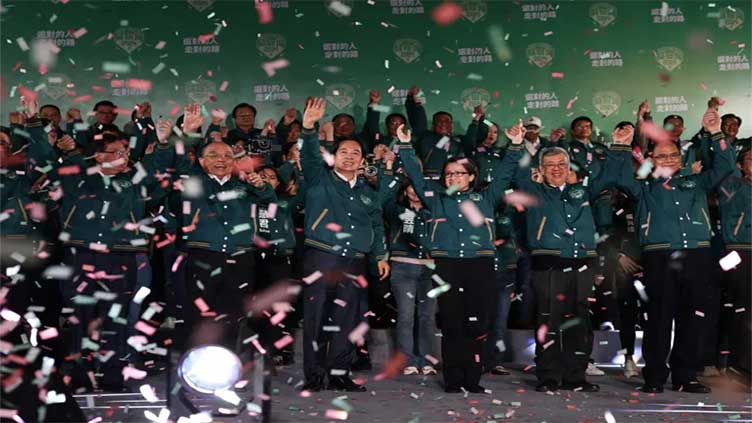Taiwan ruling party wins presidential election

World
Lai won 40.1 percent, ahead of Hou’s 33.5 percent
(Web Desk) - William Lai Ching-te from the governing Democratic Progressive Party (DPP) has won Taiwan’s presidential election, despite warnings from China – which claims Taiwan as part of its territory – not to vote for him.
The DPP does not represent the mainstream public opinion on the island, Beijing said after Lai was named the winner of Saturday’s vote, adding that the vote “will not impede the inevitable trend of China’s reunification”.
Lai, the current vice president, was in a three-way race with Hou Yu-ih from the conservative Kuomintang (KMT) and former Taipei Mayor Ko Wen-je from the Taiwan People’s Party (TPP), which was only founded in 2019.
With votes from all polling stations counted on Saturday, the Central Election Commission said Lai won 40.1 percent, ahead of Hou’s 33.5 percent.
Hou conceded defeat and congratulated Lai on his victory. He also apologised to KMT supporters for not being able to remove the DPP. Ko also conceded defeat.
“I want to thank the Taiwanese people for writing a new chapter in our democracy,” Lai said in a victory speech where he thanked his two opponents for conceding.
“We are telling the international community that between democracy and authoritarianism, we will stand on the side of democracy.”
He added that he hoped for a return to “healthy and orderly” exchanges with China, reiterating his desire for talks based on dignity and parity.
‘China’s Taiwan’
Responding to Lai’s win, Beijing’s Taiwan Affairs Office spokesperson Chen Binhua said in a statement carried by state news agency Xinhua that “Taiwan is China’s Taiwan”.
“Our stance on resolving the Taiwan question and realising national ‘reunification’ remains consistent, and our determination is as firm as a rock,” it said.
The statement said China would adhere to the one-China principle and firmly oppose the separatist activities aimed at “Taiwan independence” as well as “foreign interference”.
Taiwan’s elections carry an outsized importance because of the territory’s disputed political status. While self-governing since the 1940s, China still claims the island and its outlying territories and has not ruled out the use of force to achieve its ambitions.
In the run-up to the polls, China denounced Lai as a dangerous separatist, said he would be a threat to peace in the region if he won, and called the elections a choice between “peace and war”.
In his victory speech, Lai said the self-governed island had managed to see off attempts to influence the vote, in an apparent swipe at China.
“The Taiwanese people have successfully resisted efforts from external forces to influence this election,” he said.
Lai has maintained that he is committed to peace and open to conditional engagement with Beijing, while also boosting the island’s defences.


